 It was with some triumph that Roddy returned home from our local market a while ago with a bag of milk. I looked at it in some surprise but a closer inspection revealed the words “lait cru.” Roddy stood there grinning at me, and I realised he was as excited as I was becoming – this was raw milk, unpasteurised and fresh from the cow as nature intended it to be.
It was with some triumph that Roddy returned home from our local market a while ago with a bag of milk. I looked at it in some surprise but a closer inspection revealed the words “lait cru.” Roddy stood there grinning at me, and I realised he was as excited as I was becoming – this was raw milk, unpasteurised and fresh from the cow as nature intended it to be.
I grew up on a farm, we didn’t have any dairy cattle but we did have two ‘house’ cows, they were milked twice a day. I drank that milk from the age of 6 months old and although I am not a great “glass of milk” fan, all sorts of memories came flooding back with my first taste of that lait cru. Our milk went straight into a pail and was brought up to the house, my mother would then strain it through a muslin cloth into jugs which went in several directions around the farm to different people.
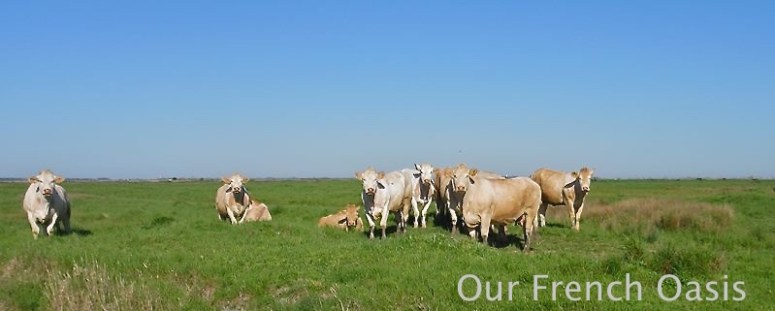
Whenever we can we buy raw milk because the taste alone far outweighs that tiny, minuscule, infinitesimally small chance of drinking something bad. This, coupled with the benefits many people feel it provides, especially for asthma and eczema sufferers, makes it a better time to return to nature than ever before. The French in particular love raw products and here it’s easy to buy raw milk, raw cheese and raw butter locally.
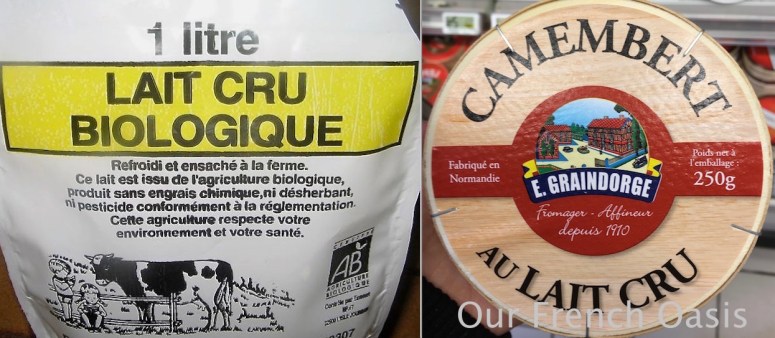
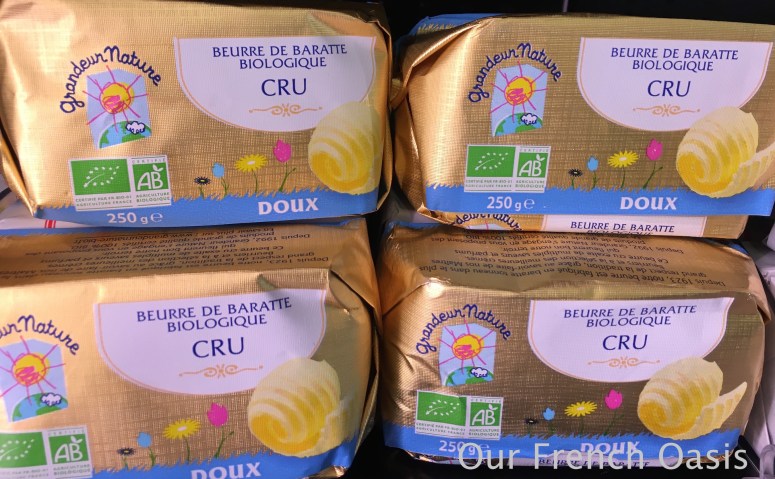
Going back to nature seems to be a recurring theme this year and quite by chance we’re now eating ‘raw honey’ too.
The extraordinary mechanisms of the bee world attract some special people. I rather think most apiarists keep bees more for the joy of keeping them than for any sort of economic return, or just perhaps because they have a sweet tooth. Last week, I travelled deep into the interior of the Poitou-Charentes, into the heart of the department of the Vienne, some two hours away, to meet one of those special people, Chris Luck. A man with a passion for bees, and for almost anything else that flies, buzzes, crawls or swims.
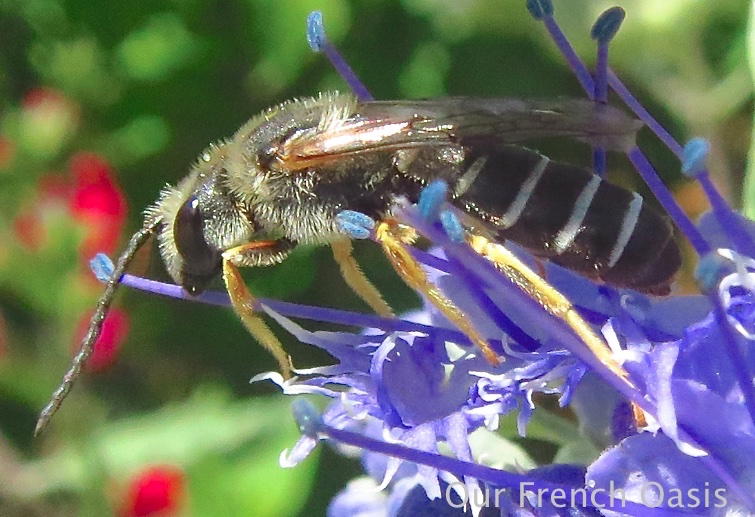 I’d tried to visit Chris for a while, but spring and early summer is the swarming season and he is at the beck and call of the telephone, hurrying here and there to examine, plan and deal with swarms as they are reported. A typical day ends very late as the best time to move a swarm is after dark, when all the bees are back in place and feeling calm. Running around the countryside after dark in a little Peugeot with several hives in the back is something I still have to experience, but I can imagine the potential pitfalls. The day I visited, Chris had nine transient swarms on the property waiting for new homes and he was also working out a variety of ways to save a colony that was now at the bottom of a five storey chimney-flue after a botched rescue attempt by a builder.
I’d tried to visit Chris for a while, but spring and early summer is the swarming season and he is at the beck and call of the telephone, hurrying here and there to examine, plan and deal with swarms as they are reported. A typical day ends very late as the best time to move a swarm is after dark, when all the bees are back in place and feeling calm. Running around the countryside after dark in a little Peugeot with several hives in the back is something I still have to experience, but I can imagine the potential pitfalls. The day I visited, Chris had nine transient swarms on the property waiting for new homes and he was also working out a variety of ways to save a colony that was now at the bottom of a five storey chimney-flue after a botched rescue attempt by a builder.
It was somewhere beyond the town of Melle that we phoned Chris on the outskirts of a small village and he appeared from down a dusty lane to lead us back to his kingdom. He and his partner Lynne have been in France for more than 20 years. They have over three hectares of old French countryside that they have deliberately let run wild, an oasis of organics surrounded by cooperative-run farmland with its burden of sprays, fertilisers and paperwork. Their house looked a little lost and camouflaged amongst the trees and growth, but the instant we stopped the car and opened the doors, the benefits of letting nature run its course could be heard and seen. A heavy continuous drone of insects and a constant chatter of birdsong vibrated from every direction and in the sunlight bees could be seen travelling hither and thither, golden motes caught in the late afternoon sunlight.
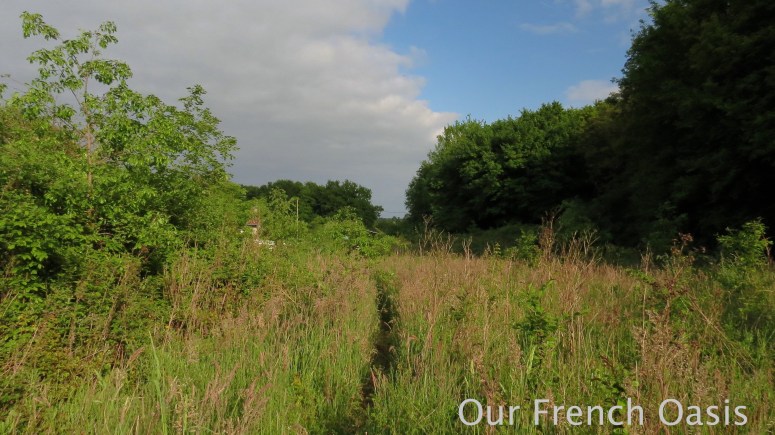
We’d ostensibly come to buy honey, six fat kilos of home-spun goodness with nothing added or taken away, but in the end the purchase was just a bonus that ended an early evening of education, philosophy and natural science. I admitted to knowing little to nothing about bees, but by the time Millie and I left we knew a great deal more! We tried to visit the hives but could only get so close before the bees made it plainly clear that on this particular day there was no easy way through to their lodgings.
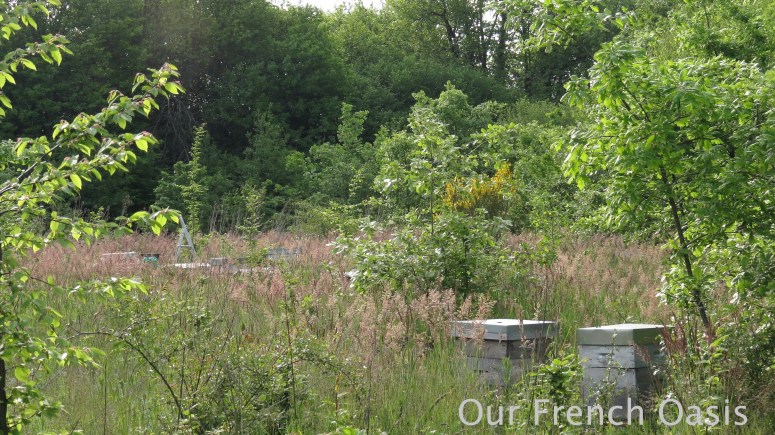
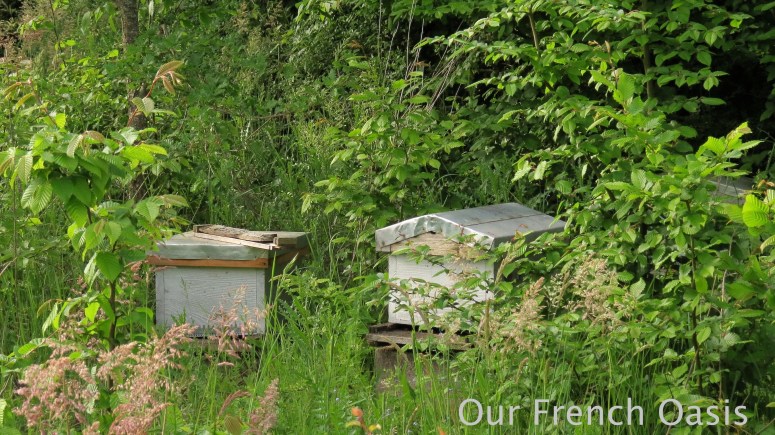
He has several dozen hives set back in the depths of his trees, but with a selection of them harbouring recently relocated and slightly annoyed swarms, it seemed a sensible decision to stay clear and see his bees at work by the cottage. Here, Chris had laid out several trays of compost in a water-tray for his little friends, and a steady stream of bees circulated, carrying water back to the colony. Around us was a veritable container garden of all sorts, utilising a variety of plants to attract and nourish his bees as a part-time destination on their foraging. The cottage was surrounded by huge swathes of blackberry bushes housing a whole host of birdlife that was obviously enjoying Chris and Lynne’s garden as much as his bees and other insects do. His love for bees and their welfare was obvious, as demonstrated by mild interruptions to our conversation as he would lean over and rescue a drowning bee from the water tray. Over a cup of tea in the depths of the low-ceilinged cottage we learnt a great deal as the early evening started to cast shadows about the greenery.
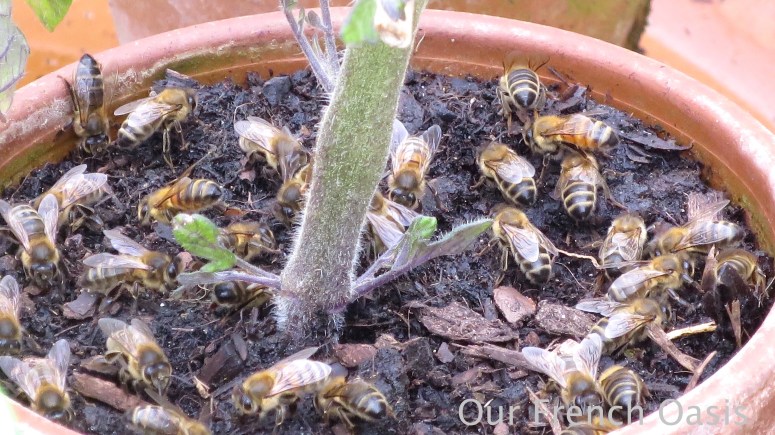
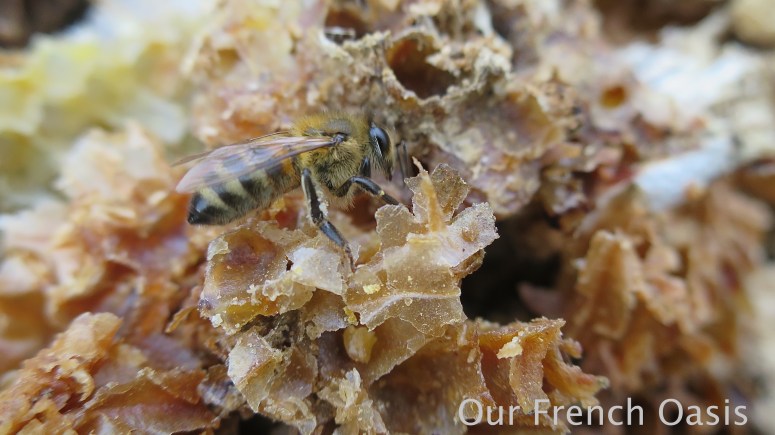
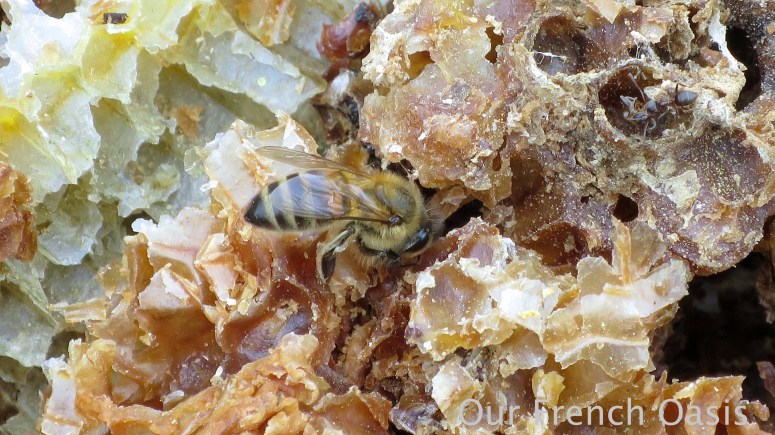
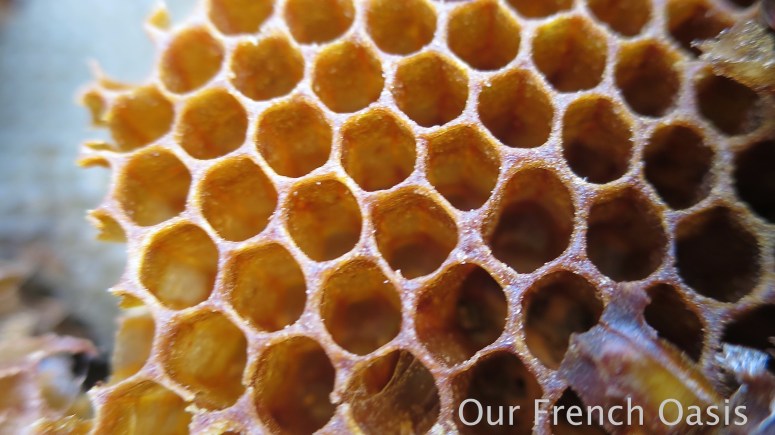
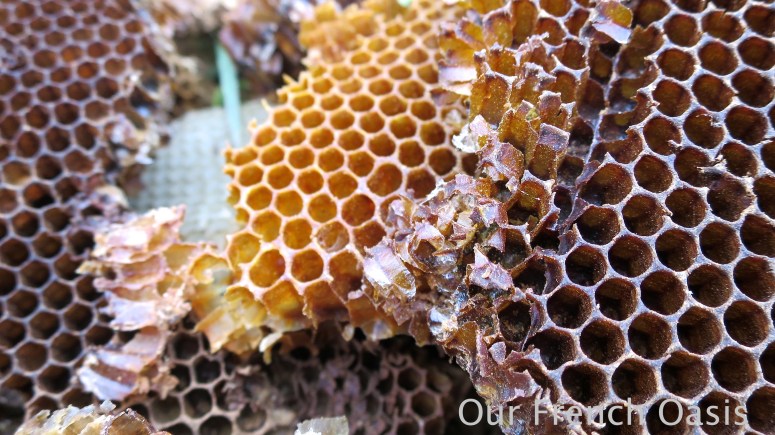
Each day at sunrise in the hive, the worker bees gather at the entrance to the nest and those ready for flight duties set off on their tasks. Some fly to fetch water, others to search for nectar. Another group will gather pollen and a fourth will go into the greenery to look for sap and resin to make propolis with, a substance which the bees use to repair the hive. Some workers stay in the hive to clean and nurse the eggs, larvae and pupae, and a further group will guard the hive from attack. Every bee in the hive knows its duty each day and peace and harmony are par for the course. There is no shouting, whistle-blowing or a bee with a clipboard dispensing orders; no, the bees know just what they have to do.
This may all seem quite inconsequential to most people, and of no importance, but there is something in the hive’s regime that is quite astounding, even miraculous, and it’s a mystery that apiarists have been trying to solve for centuries. For from day to day, the numbers in each group of bees going about their tasks in the hive vary. You’d assume this was normal too, unless you think about it, and watch the hive at work. For as more water is needed than pollen, so bees change duties, and as more propolis is needed to repair a crack, so more bees head into the trees, and so on. Not a word is exchanged, no commands are echoed through the waxy corridors, there is nothing to be seen or heard that indicates just how the bees communicate not only what is needed, but who is chosen to augment the seekers. It’s a miracle of minute communication, be it electrical, pheromonal, a question of vibrational frequency or even a chemical that affects the nervous system, no one knows; one morning 10,000 bees may go and search for nectar, and the next day it may be 20,000. When more water is required the number of water-carriers mysteriously grows while the pollen seekers dwindle in number. Something very clever happens in a bee colony that mankind has not yet been able to solve.
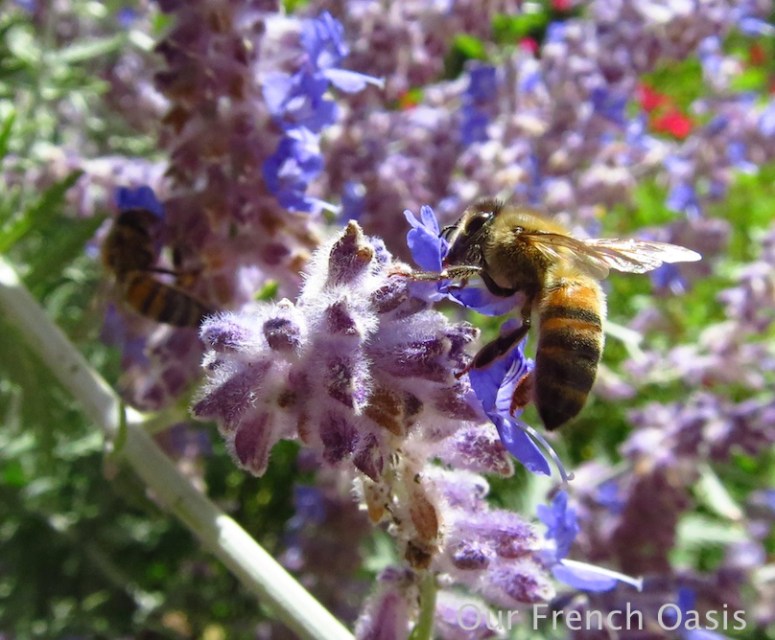
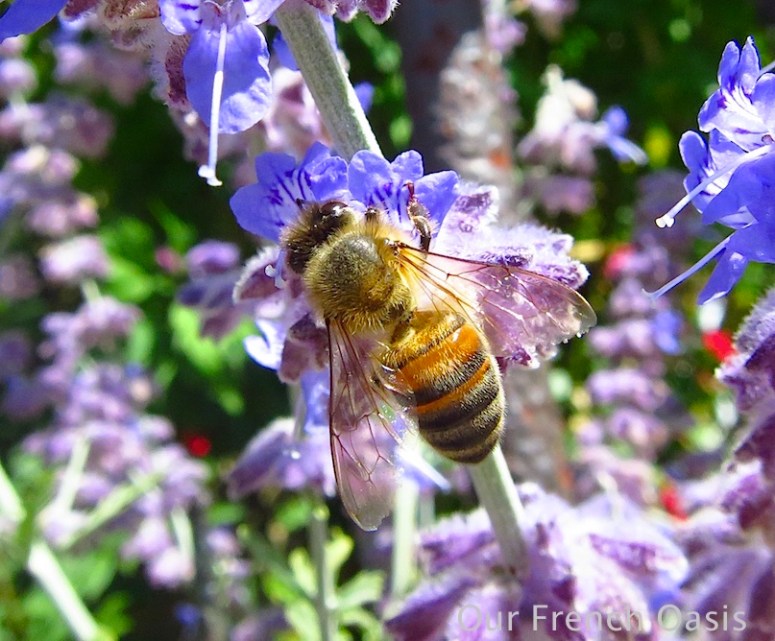 Fascinated I asked Chris how they had come to live in France. In the 1990’s they had found themselves in the Vienne, and on an impulse had bought the land and house. Situated in a quiet hamlet, Chris mentioned with a rueful grin how the neighbours had changed somewhat over the years, and how a largely rural community was now somewhat fragmented and had been replaced by long-distance tenants from the richer environs of Paris and London. Along the way farming practices have also altered, creating a landscape so very unnatural for bees and insects that he admitted to dark thoughts about the future for not only his bees, but also the honey industry itself, and possibly the countryside as a whole.
Fascinated I asked Chris how they had come to live in France. In the 1990’s they had found themselves in the Vienne, and on an impulse had bought the land and house. Situated in a quiet hamlet, Chris mentioned with a rueful grin how the neighbours had changed somewhat over the years, and how a largely rural community was now somewhat fragmented and had been replaced by long-distance tenants from the richer environs of Paris and London. Along the way farming practices have also altered, creating a landscape so very unnatural for bees and insects that he admitted to dark thoughts about the future for not only his bees, but also the honey industry itself, and possibly the countryside as a whole.
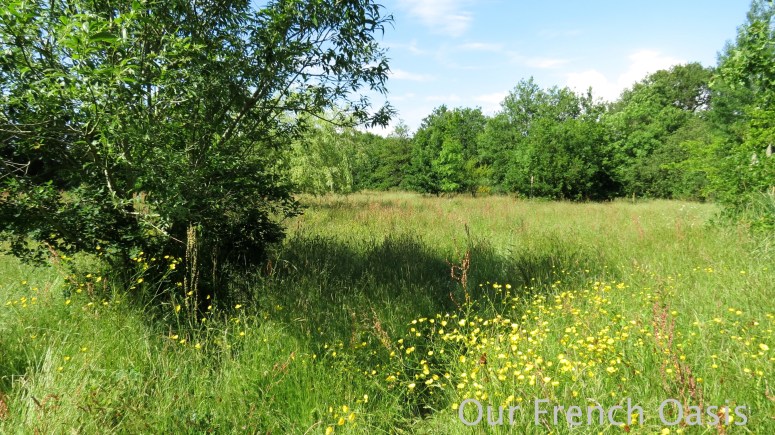
It was a sad note to leave on, but as our box of honey-pots in the boot of the car slid around with each turn of the small country lanes, I hoped on our way back home that as long as there are men like Chris, then there will always be outposts of bee territory, and honey to take home. Bees, of all varieties, are so terribly important to nature.
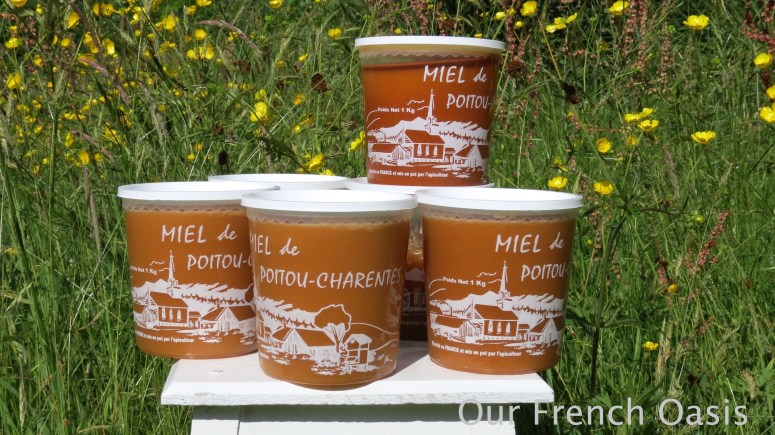

I love bees! We tried to keep them a few years ago, but Luc made a new ‘house’ for them and they all ended up dying 😦 We now have a hive in a tree, which they seem to prefer. We buy our honey from someone in the village though.
Hi, I shall have to pick your brains about bees, do you know why they died? we really would like to have a hive. Do you collect any honey at all from the hive in the tree? I am looking into the his a lot further! Susan x
Luc became quite the specialist – he read loads about it, spoke to a number of specialists and then built special eco-friendly hives for them. He’s even got the space suit etc. What killed them was the fact that unfortunately he transferred them to their new ‘house’ while it was still too cold outside (he was going away for a few weeks and so had to do it)… We even have a thyme patch because we wanted thyme honey… We don’t collect honey from the tree. Anyway, Luc’s ya man! 😉
Wow, did you not think about getting another swarm for the hive? Thyme honey, sounds delicious. Not sure if we will ever do it, but we are learning more and gathering information! New chicks due Sunday, so no doubt chickens will take over for the summer and then we’ll think again, but I will remember your temperature comment!
Very informative post!
Thank you so much Rita. Enjoy the rest of your week, Susan x
Although I do not drink milk as such, I try to buy lait cru every week at the market to use in baking and cooking and Stuart enjoys the odd glass now and then. In winter it makes the best hot Chocolat. Isn’t it so nice to be able to buy all these natural and wonderful products close to home? Honey we also get from a local farm about 3 km away.
Hi Nadia, no I am not a milk drinker either, I just have a little in coffee, but we try to buy lait cru whenever we can and the children love it. We are so fortunate to have so many of these products so close by and now of course with the warmer weather the markets are just overflowing with fresh local produce. Hope you are over any jet lag and happy to be home! Susan x
This article gave me a real buzz!! Very informative Susan, as always, and I loved the pictures too.
Hi Penny, ha ha ha, very good! Thanks so much, there was a great deal to learn and it was so fascinating, would love to have bees at the end of the garden next! Susan x
Love honey – toast, butter and honey. Yum. I shall have to try and find a local beekeeper now. Raw honey sounds even more yum. Thanks for all the titbits of info, Susan. Love the thought of bees communicating telepathically – would make a great cartoon – wish i could draw….
Hi Phil, I believe raw honey tastes better than any other type of honey, just so much more flavour. How the entire hive works is quite fascinating and I find the more I am learning the more interesting it gets, bees really are incredible creatures. Susan x
Beautiful photos! It’s too bad, as Chris notes, that people move to the country and then urbanize it.
Thank you, I guess people move to the country thinking they would like to try country living and then find they miss things about town life and rather than moving back they make compromises. Susan x
Lovely post. Great bee pics and will def try Lait Cru (never tried it before)
Hi Pauline, Thank you so much. Do try lait cru, if you are a milk drinker you will really taste the difference, there is a great deal more flavour. Susan x
Fabulous photos.
It’s too bad what Chris notes, that people move to the country and then urbanize it.
Not sure why this appeared twice as two different variations of your name?!
I don’t know. I subscribe via Bloglovin’. Very convenient. BUT I have had problems with my computer, and the application crashes when I try to write a comment. So I called it up directly on your site, didn’t see my comment, and tried to recompose it. Sorry about the duplication.
I wouldn’t worry at all. I can’t get on with Bloglovin at all, I don’t know why, I wondered if it was because I use a Mac, but it never seems to work properly for me and I have totally given up using it, I can never leave comments!
Looks like you had another lovely day. Yes bees are amazing creatures and without them not a lot of plants will get fertilised, they do not just take care of themselves but also of us without bees we would not be able to eat….
We had a fabulous time Heather, after school one evening. It is a couple of hours away so we didn’t get back until very late! But it was worth every minute, it was totally fascinating, they are the most amazing creatures. Susan x
Love this post and the information and photos you included. Thank you!
Thank you so much Anne, I am so glad you enjoyed it. Have a lovely end to the week, Susan x
This was so interesting thank you. I just love the way you write and tell stories, I could read your words for hours.
Thank you so much Jane for your lovely kind words, I am so glad you are enjoying reading the blog. Bees are so fascinating it was rather fun to learn more about them and then to be able to share what we had discovered. Susan x
Hello Susan.. I have heard that there is an underground network where folks here can buy raw goat and cow milk. I have had raw honey….it is delicious.I think in some instances we have pasteurized ourselves into very bad health.
The point of people moving to rural areas because they fall in love with the natural environment and quieter lifestyle…and then proceed to bulldoze that very natural environment…..and demand all the urban amenities that they left behind….happens here on our small island also….you don’t what you had until its’ gone.
Ali
Hi Ali, I think you may very well be right. As I said I had raw milk straight from our cows since before I could walk and it certainly never did me any harm! The problem is I think people think they want the quieter country lifestyle and then they realise it really is VERY quiet and they miss their town lives, so they try and bring a little city living to the country as a compromise. That is my theory. It is very sad and it is certainly getting harder and harder for people to live in true rural isolation these days. Susan x
An NPR report in February stated, “U.N.-sponsored report drawing on about 3,000 scientific papers concludes that about 40 percent of invertebrate pollinator species (such as bees and butterflies) are facing extinction. Vertebrate pollinators (such as bats and birds) are somewhat better off by comparison — 16 percent are threatened with extinction, “with a trend towards more extinctions,” the researchers say.”
Scary times as the report also indicated that 75% of the world food crop depends at least partly on pollination.
So best of luck to Chris and Lynne in their endeavors. And I can say that as someone who is highly allergic to bees. But I still appreciate their great value.
Hi Mary, scary times indeed, this makes quite horrendous reading, what are we doing to our world? I admire Chris and Lynne for all they are doing but sadly it needs so many more people to make a difference, but every little bit helps. Thank you for all of this information, I really appreciate it and am going to find the report, if I can, on the Internet and read more. Thank you, Susan x
Your blog is charming, you write well and such good photographs too! Only just become a subscriber so looking forward to receiving the next one. Lovely article about bees – such fascinating and clever creatures aren’t they? (Like their honey too!)
Hi Jenny, thank you so much and welcome to the blog, I am so happy to have you following along. The more I am learning about bees the more they fascinate me, they truly are amazing creatures. Thank you for taking the time to comment, it is much appreciated. Susan x
So funny that this is the second time today that bees came up! I was walking along the small lake outside my office building this morning and spying at some baby blue herons nesting in the tress and a co-worker mentioned that both of the wood duck nesting boxes on campus had been taken over by bees. They decided the boxes would make excellent places to build their hives!
Hi Nancy, what a coincidence and how fascinating.So will they put out new nesting boxes for the ducks? Would love to have seen the baby herons, it sounds as if you work in the most gorgeous place, you are so lucky to have somewhere like that to walk where you work. Enjoy it before the Florida summer heat & humidity takes over! Susan X
We have always drunk raw milk every since I cam across in on sale in California, so interesting to see your insight into it and to see your trip to the bee farm as well, toast and honey for weeks in your house I imagine!
Hi Helen, I think once you have got used to the taste of raw milk it is difficult to go back to regular pasteurised milk as it becomes totally tasteless. The bees were quite fascinating, they are amazing creatures. French bread and honey for the children’s afternoon gouter is definitely on the menu now! Susan x
My father was a keen bee keeper when I was younger and your post has brought back some wonderful memories Susan, and also some painful ones involving a swarm one unfortunate day! Lovely writing as always.
Hi Lily, What happened with the swarm? It sounds very scary, I hope no one was too badly stung and that no one was allergic. Did you ever put on the protective suit and look inside the hives and collect honey with your father? We would love to have a hive at the bottom of the garden, it’s a plan for the future. Susan x
I think I was more scared than they were angry, I hid inside! Yes my sisters and I used to always go and collect the honey, we loved it.
Lucky you being able to collect the honey, it is my dream to be able to go and do this! Susan x
Great post, Susan. I would love to try raw milk some time and I do like raw honey. Very interesting about the bees. I had heard the honey bee population is way way down. So sad.
Next time you come to France Kim you have to try it! If you like milk you will be hooked, there is just so much more flavour. The bees are indeed severely threatened, we learnt so much, it was so fascinating, bees are such amazing creatures. Susan x
Susan, you are the bee’s knees. Wonder where that expression originated.
Thank you Eileen! I wonder where that expression did come from? A quick search of Mr Google seems to suggest it originated in the 1920’s in the USA along with the “cat’s whiskers” Such great expressions, I’ll use them on my children tomorrow and see what surprised looks I get! Love doing this sort of thing so that all these old expressions do keep going through the generations! Have a lovely end to the week. Susan x
I can relate. Every so often my subconscious throws out an expression in broad scots that confounds everyone, me included. Maybe I’m channeling my granny because I swear I never knew them. Anyway, “lang may yer lum reek,” whichever country you’re in, Susan.
Thank you Eileen! Now I have no idea where I would be without Google! So this revealed it was a hogmanay expression which basically meant “may you always have fuel for the fire” and if this is the case a very poignant remark at the moment. We don’t need fuel for the fire as it’s warm but we do need fuel for the cars and France is on strike!!! Please do tell me if google got it all wrong! I have never heard such an expression but had fun trying out my Scottish accent, I too have many Scottish ancestors! Susan x
It’s exciting to see things are literally BUZZING about and so beautifully! Anita
Thank you Anita, plenty of buzzing around here!It was an amazing evening, we learnt so much and now of course we want our own hive at the bottom go the garden! Susan x
Curiously, I have just finished reading a wonderful books about bees by a chap called David Coulson. It’s called “A Sting in the Tale” and it was a startling good read; very informative, humorous, and philosophical, and almost Gerald Durrell-esque for entertainment value. I can relate to everything you’d said here because of it, Susan, and urge anyone with even a passing interest in what bees do for us, to grab a copy. It’s available in paperback from Amazon if you can’t find it at your local bookshop (which hopefully sells honey and other important stuff like so many do nowadays).
Hi Simon, I shall go and have a look on Amazon, thank you, sounds like a fabulous read and we are seriously considering a hive at the bottom of the garden so I shall go and read this first. When we lived in the UK, we once had one of those little bookshops you talk about, with local produce for sale in the corner, magical. Susan x
Just ordered the book. It has excellent reviews so thanks for that Simon!
Jenny, I hope you enjoy it as much as I did. It was one of the most thought-provoking books I have read in a long time, and to be blunt, it should required reading and a choice for a school syllabus. I’m afraid that humans came out of it looking rather bad…..
I was also rIsed on raw milk delivered to our home by a nearby farmer. We norwegian s loved the top cream on fresh bread with just A nit of sugar! And yes the bees were a wonderful site as your blog so totally describes. Thanks for a step back i to the quieter farm lufe in the beauty of framce.
Thank you Mary, it is a very special place to live and I feel very lucky to be able to bring the children up here, that slightly more simple upbringing as you say, like you had in Norway, which sounds as if it was idyllic. Susan x
De nouveau un sujet de discussion remarquablement intéressant. Merci Susan de nous faire découvrir ces apiculteurs aussi passionnés de leur métier. Chris et Lynne sont des pionniers. Il faudrait que beaucoup d’ agriculteurs les imitent pour produire Bio, sinon les conséquences pour l’ homme seront (et sont déjà ! ) catastrophiques. Stop aux pesticides, insecticides,fongicides et engrais qui polluent les sols, les animaux et les humains.Très intéressant d’ apprendre la vie sociale des abeilles. Un véritable cours de Science naturelle.Encore bravo pour ce passionnant post avec ces magnifiques photos des abeilles et votre style d’ écriture simple, précis et informatif. Parfait ! Moi et vos 10 000 followers sur Facebook vous disent mille fois merci !/ Another interesting and remarkable Topic! Thank you Susan to make discover these beekeepers so passionate of their job. Chris and Lynne are pioneers.It would be necessary that many farmers mimic them to produce Bio, otherwise the consequences for the human being will be ( already are! ) devastating. Stop to pesticides, fungicides, insecticides or fertilizers which pollute soils, animals and humans. It was very interesting to know about the social life of bees. A real course of natural science.Congratulations again for this exciting subject with magnificent pictures of bees and your style of writing, simple, accurate and informative.Perfect! Me and your 10 000 folowers on Facebook tell you thousand times thank you! Philippe
Thanks so much Philippe, it is a subject I know little about but it was fascinating to start learning and bees are amazing. As you know I truly believe in a lifestyle as organic as possible and in raising our children to believe in this too. It was fun to write about something completely different for a change and I am so grateful to Chris and Lynne for giving up so much of their prescious time to talk to us and explain so much to us, they are really lovely people. Have a great weekend, if only the weather would work out what it wants to do! Susan x
Google rules! The saying does indeed tie in with the tradition of “first footing” on Hogmonay. In Aberdeen, we used to “see in the New Year” with a late supper and Dad’s recitation of the Selkirk Grace, then the toast at midnight and Auld Lang Syne at the ringing of the bells. I seem to remember bonfires out on the hills too. We would then walk what seemed miles, doing the rounds of friends and neighbours, through frosty gas-lit streets would you believe? Oh, the joy when the rowan-decorated door opened and the light and warmth spilled out. “Michty me! Come awa’ in, loons and quines. A guid New Year tae ane an ‘a’ and mony may ye see!” Good luck followed if the first person across the doorstep in the New Year was male, dark-haired and bore a lump of coal. In the old days there were other symbolic offerings to ensure the house never went cold or hungry. Blondes meant trouble, going back to the Vikings, hence the dark hair preference. Hospitality dictated food was served and drink taken. If you were really lucky clootie dumpling was on offer, with the occasional silver sixpence baked in it but black bun and shortbread were always favourites and the quality of the home baking severely judged. Not so the wee dram. My brother, in constant fear of imminent starvation due to his boarding school experiences, would fill his pockets with warm sausage rolls for the next leg of the journey. Thanks, Susan. Who knew a bee story would inspire a trip down memory lane in Canada and send you down the Google trail in France? Now, if only we’d had Uber back in the day. Cheers.
Hi Eileen, utterly fascinating thank you. I would love to sit down with a glass of wine with you one evening and chat away with you, I know I would ask so many questions and I know the children would love to ask them too, I love hearing about people’s stories from the past. I can quite relate to your brother filling his pockets, boarding school food was the worst, I still can’t eat cabbage, I can’t even stand the smell of it, school put me off it forever, the food was AWFUL! As I think I may have mentioned many of my ancestors were Scottish and emigrated to Canada, to Vancouver between the wars. I hope Spring is finally blossoming where you are, Toronto? If my memory serves me correctly, if I am wrong, apologies! Have a lovely, happy, peaceful and sunny weekend, Susan x
The photographs!!!!!!!!! Please consider contest entry!!!
I will never again see a bee without those strikingly gorgeous images forever in my mind’s eye. I now feel so close to the bees and will double my efforts to sign petitions and support their safety in every way possible.
I learned so much and am so grateful!! Truly another miracle of nature in so many ways.
I still cannot get over the photos – so stunning – and the substance, unforgettable.
I’m smitten by the bees – inspired………..thanks for bringing this close up view to us!!
Thank you so so much! there was so much to learn about bees, and so much I didn’t know. I felt very humbled, as I realised how much we just take for granted. I was totally fascinated the entire time we were there and I really do plan to know more. Everyone wants a beehive at the bottom of the garden, so maybe I will the opportunity to take more photos! Have a wonderful Memorial Day weekend, Susan X
I love raw honey, but I have yet to try lait cru! As you mentioned, I am not a big milk drinker either, but I think it would be a great experience to try it. Also, great information on bees and honey. Your pictures are wonderful!
Thank you so much. As you live in France, do go and buy some lait cru, just to see if you notice the difference. I don’t drink milk on it’s own, in fact I don’t use milk much at all, just a little in a cup of coffee but I can even taste the difference in that. The children are the milk drinkers and they love it! Hope you have a lovely weekend, Susan X
Winnie-the-Pooh would approve of this post!
So much good information, and those beautiful photos.
Thank you. This one requires re-reading in order to absorb all the work that went into it.
Winnie-the-Pooh would love to live with Chris and Lynne, so much honey everywhere! It actually took far longer to write than I would ever have imagined, there was so much information to try and remember and to make sure my facts were correct as it was a new subject to me too. It was rather like being back at school, but at a very fun interesting school where it is judged by great readers and not a teacher who would probably have told me my sentences were too long! Have a great Memorial Day weekend, Susan x
What a fascinating post. I was at Abbey Fontevraud a few weeks ago and they had bee hives there. I would love to have some-however given my allergy I keep my distance. You have me craving all of these foods.
Hi Esme, I really want bees, but I am nervous! I am not allergic to them, and I don’t mind the odd bee buzzing around but an entire swarm, that’s a slightly different matter! However, the honey might just win me over! Susan x
Lovely post especially about Chris’s bees – I’m a first year keeper.
How exciting, would love to hear how you are finding keeping bees, we are keen to get a hive, but also quite nervous, if you get a moment, do tell me more please. Susan x
Chris is a true champion of the bees, and we share his concern at the destruction of their habitat. We also buy his honey. 🙂
Hi, I was so happy to have found your blog and thanks for coming over to mine. It is very very worrying for bees and their habitat. We are seriously thinking about keeping a hive here. Susan x